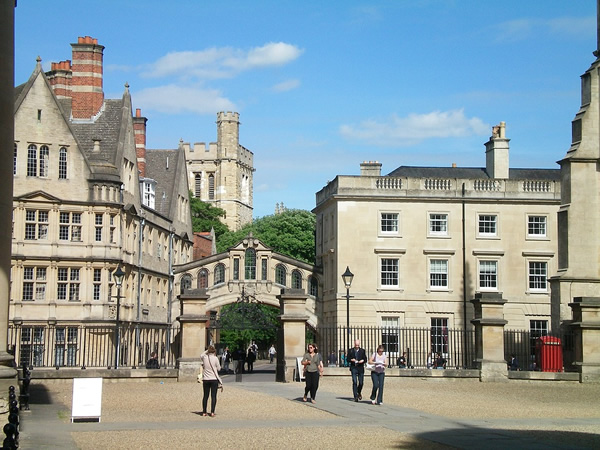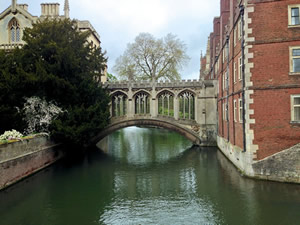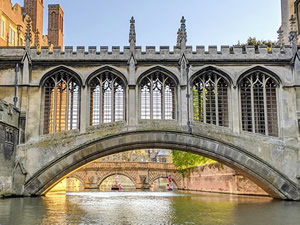Direct Enrollment at Cambridge or Oxford for Study Abroad
For Those Accepted, The Rewards Are Impressive
By Amanda Ruggeri
|

|
|
Oxford University campus.
|
Oxford and Cambridge are, respectively, the oldest and second-oldest universities in the English-speaking world, dating back almost a millennium. The history, tradition, and beauty of the schools attract thousands of tourists
each year. Famous alumni include everyone from Isaac Newton to Bill Clinton, and history hides in every corner: I’ve just learned, for example, that Oliver Cromwell’s head is buried in my courtyard.
But the schools, of course, aren’t just spooky stories and Gothic spires. The US New and World Report yearly report ranks Oxford
and Cambridge as the two best universities in Europe, as well as at number five and seven, respectively, worldwide — ahead of Princeton, Yale, Columbia, and many other of the world-renowned American colleges and universities.
So if you’re dreaming of studying abroad at Oxbridge, whether for a year or a term, you’re not alone. But how can you make it happen? Yes, you can. For an academic year, a semester, or for an International summer term program.
The Time is Now
First of all, start planning as soon as possible. To go abroad for the Spring semester of the following year I applied in March of the previous year — and that was cutting it much too close. Know whether you want to go abroad for a year or a term by early
fall of your sophomore year. If you want to do a junior year abroad you’ll probably have to apply by October. And to do that you’ll have to have recommendations from professors, writing samples, and a transcript. So get started now.
Keep in mind, too, that these are prestigious universities. Your academics count. It’s applying to college all over again: to have a shot at your top choice, you have to take challenging classes, be involved on campus,
and keep your grades up.
Oxford or Cambridge?
|

|

|
|
A bridge between buildings at Cambridge University.
|
A bridge between buildings at Oxford University.
|
The first decision you have to make is whether you want to study at Cambridge or Oxford. While the schools are similar in many ways — and equally impressive — which one you choose will have a significant impact
on your experience. At the very least, it will determine which rowing team you’ll be cheering on at the annual boat race.
Oxford is a slightly larger, busier city than Cambridge; it’s also more industrial. And despite the ancient history and beautiful architecture of both universities, Oxford crops up more often in popular media. (Many
of the scenes from the Harry Potter films were shot there).
Cambridge is also located in a bustling medieval town. But it’s more famous for its large stretches of green and its idyllic Cam River, perfect for punting. On the other hand, Cambridge is about a half an hour closer
to London than Oxford … not that you’ll have much time to head in.
One of the most important differences between the schools, though, is the number of other study abroad students. Oxford, my adviser told me, is crawling with American students. But at Cambridge they’re few and far between.
Only one of Cambridge’s 31 colleges accepts direct applications from study abroad students compared to about half of Oxford’s.
In terms of academics, it’s a toss. And really, when everyone agrees the schools are two of the top 10 in the world,
who cares?
So let’s recap. Oxford: a little bigger, a little older, a little more famous, much more American. Cambridge: a little more pastoral, a little more British, a little better (just kidding, but I have to defend my college).
Both: incredible academics, amazing histories, great locations, beautiful scenery, and experiences you’ll remember forever.
Now What?
First, check out your home school’s study abroad website or office. Some schools have cultivated particular relationships with an Oxbridge college — and these can help you. Yale, for example, has a program with Cambridge’s Pembroke College, one of the only Cambridge colleges to accept study abroad students, which makes it simple to apply directly to Pembroke. Yale also has study abroad programs available via relationships with other American colleges and Oxford.
For most other schools, though, you have to go through study abroad programs at other universities. One of the most popular programs is IFSA-Butler.
Not everyone is eligible: you have to have the required G.P.A. (usually a 3.0 or higher) and an otherwise solid academic record. You send an application to IFSA and they forward it to the selected college. Once you’re in the program you
get all sorts of other perks, from information on visas and packing, to an orientation in London, to weekend trips during your term.
The caveat? The price, of course. Applying directly to an "Oxbridge" college, rather than through a program like IFSA, is often cheaper. On the other hand, it can also be a bit overwhelming to arrive
without having a formal orientation or support network.
Summer Programs
in Oxford and Cambridge
If you don’t want to take a term off from your home school, you don’t have to relinquish your dream of studying at Oxbridge. Both Oxford and Cambridge run a number of summer programs for international students.
The Pembroke/King’s Summer School at Cambridge, for example, is eight weeks long, offering courses ranging from “Orientalism and the Western Imagination” to “Creative Writing in Cambridge.” Just search on the Oxford
or Cambridge websites for “Summer Programs” for more information. And, of course, there’s always the Rhodes scholarship.
Amanda Ruggeri is a senior at Yale University. She spent the spring semester of her junior year studying abroad at Pembroke College, Cambridge University.
|
